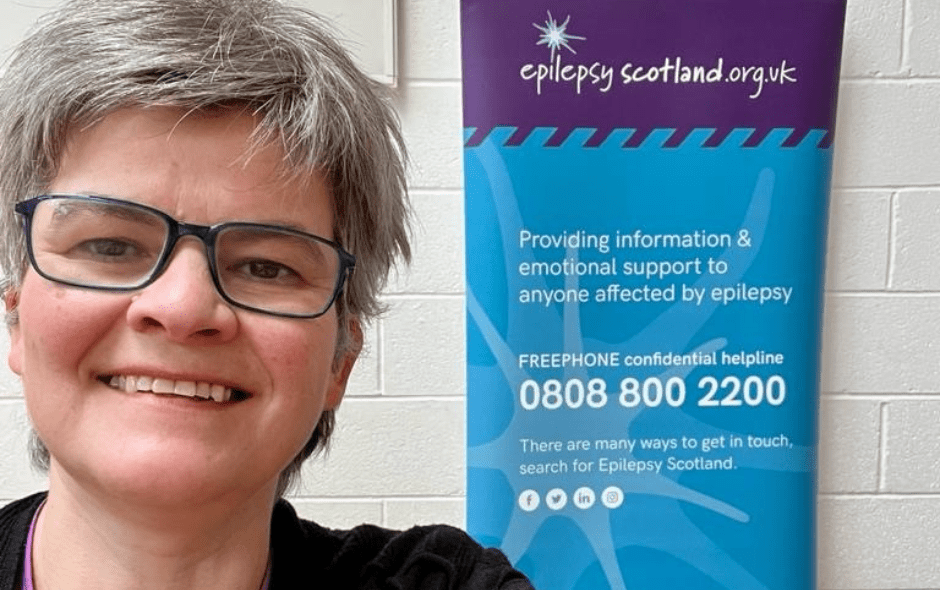What is it like being a Helpline and Information Officer? Uschi, one of our two Helpline and Information Officers, gives us a bit of an insight into her job and what motivates her to still keep going 17 years on.
So, what is it you do? I spend a lot of time in my personal life explaining to others what I do, and who I work for.
People’s reactions can be anything from, ‘oh, my cousin has epilepsy, I know what it’s like’ to ‘I don’t think people with epilepsy should work’.
My background has mainly been equality focused, and when this job came up 17 years ago, I just went for it. I’ve never looked back.
I work alongside my colleague Stuart, also a ‘long termer’ like myself. Together we cover our helpline.
On a busy day, that’s all we do, keeping up with calls and catching up on enquiries can be a full-time job in itself.
Every call is different
Every call is different, you never know why people phone. Many people contacting us have serious mental health struggles on top of their epilepsy.
Or they feel totally devastated at a new epilepsy diagnosis. We get contacted by parents who are at their wit’s end or struggle with long NHS waiting times.
A recent caller had been told they would need to wait 45 weeks before their child could be seen by a paediatric epilepsy specialist.
These are the really difficult calls because you feel the parent’s desperation and there is very little we can suggest.
It doesn’t make us feel good and leaves you with a sense of failure at times.
We are quite clear on our helpline that we cannot give any kind of medical advice. Strict boundaries are really important in our job.
We talk people through their many questions about epilepsy and also send out information booklets.
A lot of the time we listen and give someone the space to talk about some extremely difficult things.
Some of our callers feel suicidal, and these are the calls you never ‘get used to’. There is no time limit on calls, and we often spend an hour, sometimes longer, on the phone with someone who really needs us.
Our Check-In Service
Stuart and I also run our Check-in Service. This is a service we set up during Covid and lockdown.
Demand for this service continues to this day, so we’ve expanded it, and we now support people with weekly check-in calls on an ongoing basis for a given time.
Having regular contact with us, and building up a rapport and relationship of trust with us can genuinely benefit those who are going through a difficult time with their epilepsy and/or mental health.
Some of our check-in clients have experienced incredibly challenging and complex situations and have found this service to be literally a lifesaver.
Both Stuart and I have counselling skills and also suicide intervention skills. You really need this in our job.
We know how important it is to look after our own wellbeing in this job, so we do a lot of debriefing with each other, get support from our line manager and also have regular non-managerial supervision with a psychotherapist.
I also do most of Epilepsy Scotland’s writing. So, on a day when the phones are quiet, I tend to get down to writing. Most of the leaflets you see on our website have been written by myself.
It’s a constant process of reviewing, updating and also writing new information making sure the information we provide is reliable and accurate.
If this doesn’t keep us busy, we also attend events and organise our own information events.
Many of them are a mixture of in-person and online events, such as our popular online information sessions, or our informal epilepsy chat sessions.
They are a great opportunity to spread some much-needed epilepsy awareness, and I get a real buzz from delivering these sessions.
Online support group
We also set up a monthly online support group, which is hosted and facilitated by my colleague Stuart offering a supportive space to get together for anyone affected by epilepsy.
I always like to reflect on my day as I leave the office. There is usually something that stays in my mind for a while.
Walking home helps me to process some of my own emotions. You can’t help but be affected by some of the calls. I deeply care about any of my callers and clients.
The day when I get up and remain unaffected by any of this, is the day I will hand in my notice. You can’t do this job in a cold-hearted way.
You are dealing with people’s lives, traumas and emotions. For people to trust us with this is incredibly humbling. I feel genuinely privileged every day. I really do have the best job in the world.
Our Helpline is open to anyone who has questions about epilepsy or needs guidance to find the right support for them.
Call us on 0808 800 2200 or email contact@epilepsyscotland.org.uk




